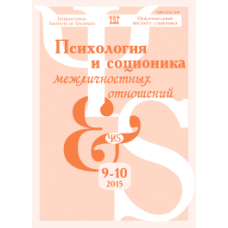Номер № 9-10/2015 журналу «Психологія та соціоніка міжособових відношень»
Питання освіти
Маджуга А.Г., Синіцина І.А.
< h4>Фрактальна педагогіка як імператив сучасного соціально-гуманітарного знанняУявлення про освіті як способі трансляції знань не відповідають викликам сучасності, оскільки методологічні установки та практично реалізовані дидактичні форми, методи та засоби більшою мірою відповідають парадигмі класичної та некласичної раціональності, тоді як постнекласична дійсність стверджує інші цілі та пріоритети. Автори теоретично обґрунтовують необхідність введення в категоріальний апарат сучасного соціально-гуманітарного знання поняття «фрактальна педагогіка», яка дозволить інтегрувати природничо та соціально-гуманітарні уявлення про людину як багатовимірний феномен, обґрунтувати вибір засобів, що забезпечують розкриття реальних та потенційних можливостей та самореалізацію особистості. У цій статті концептуалізовано ідеї фрактальної педагогіки у рамках ноуменальної ментальності; вперше дана дефініція поняття «фрактальна педагогіка», розглянуто її базові принципи, представлено історичну ретроспективу еволюційних перетворень людини з позицій теорії фракталів. фрактальної педагогіки, фрактальність, культурно-феноменологічний компонент фрактальної педагогіки, поліфонічна самість.
Соціоніка та виховання дітей
Мегедь В.В., Овчаров А.А.
Як знайти правильний підхід до дитини h4>
Дані конкретні рекомендації щодо гармонійного розвитку дітей кожного з 16 соціонічних типів особистості.
Ключові слова: соціоніка, розвиток дитини, тип особистості, виховання.
Овчаров А.А.
Стадії розвитку мислення дітей на різних етапах соціалізації особистості
Описана зв'язок стадій розвитку за Ж. Піаже з розвитком психічних функцій Юнга-Аугустінавічюте, що розглядаються в соціоніці.Ключові слова: соціоніка, психіка, розвиток, Ж. Піаже, психічна функція.
Інтертипні відносини
Шлаїна В.М.
Механізми стресів у міжособистісних контактах
Розглянуто причини виникнення стресів у міжособистісні контакти. Описано механізми стресу та способи регуляції поведінки людини та її відносин з оточуючими. Показано, що ресурси людини — це вміння взаємодіяти з оточенням, соціальний інтелект та соціальна компетентність.Ключові слова: соціоніка, інтертипні відносини, міжособистісні стосунки, стрес, соціальний інтелект, комунікативна установка, ділове спілкування.
Алексєєва І.І.
Проблеми у відносинах ревізії
Розглядаються реакції функцій блоків ревізора та підревізного на вербальні та невербальні дії одна одної.
Ключові слова: тип інформаційного метаболізму, функції блоків, аспект функції, ревізні відносини.
Методи соціоніки
Гуленко В.В.
Базові конфігурації соціону
Проведено зіставлення рівнів комунікативного простору та структурних одиниць соціоніки. Вищою одиницею соціонічної ієрархії є соціон, що складається з чотирьох типових груп. Кожна така група, своєю чергою, складається з чотирьох типів, а кожен соціотип поділяється на чотири функції. Социон описаний у чотирьох базових змін залежно від цього, через систему яких малих груп він розглядається.
Ключові слова: соціоніка, тип, група, комунікативний простір, функція, установка.
Шульман Г.А.
Основні закономірності соціоніки
Викладено результати досліджень у соціоніці Аушри Аугустинавічюте (інтерпретація інтертипних відносин як Системи "сильних" і "слабких" взаємодій, Куб соціону як інформаційно-довідкова система, Періодична система соціону, що дозволила ввести чотирикомпонентне бінарне кодування типів та кількісні співвідношення у вигляді коефіцієнта комфортності у картину інтертипних відносин). Висловлено припущення про можливі сфери застосування соціоніки.
Ключові слова: Періодична система соціону (ПСС), базис Юнга, базиси Рейніна, множинність ПСС, соціонічний тип людини (ТІМ), міграція ТІМу в інші базиси, ТИМ як імовірнісна хмара існування у психоінформаційному просторі.
Соціонічні портрети
Філатова Є.С.
Психологічні типи в біографіях. Джордж Вашингтон
Досліджується соціонічний тип видатного американського державного діяча, першого президента Сполучених Штатів Америки (1789–1797), творця американського інституту президентства. Показано, що він належав до типу логіко-сенсорний екстраверт.
Ключові слова: соціоніка, соціонічний тип, психологічний тип, логіка, сенсорика, екстраверсія, раціональність, Джордж Вашингтон.
Інформаційна структура суспільства
Букалов А.В.
Структура соціуму як аналог ДНК
Показано, що реальний соціум має приховану структуру соціону, яка маскується вертикальними та горизонтальними соціально-інформаційними зв'язками, але стає особливо значущою в моменти перебудови соціуму, деформації його соціальних інститутів.
Ключові слова: соціоніка, соціологія, інформація, кодування, ДНК, еволюція, соціум, сім'я, держава.
Енциклопедія відносин
Ципін П.Є.
Погляд на сексуальність крізь призму соціоніки
Описано особливості ставлення до сексу та сексуального поведінки з дуальними партнерами для всіх 16 соціонічних типів.
Ключові слова: соціоніка, сексуальні відносини, тип особистості, сенсорика, інтертипні відносини, дуальність.
Практика типування
Быстрова А.А.
Типологія Афанасьєва та визначення соціонічного типу
Дані описи поєднань інтуїтивних та сенсорних типів з різним становищем Фізики за типологією Афанасьєва. Запропоновано шляхи підвищення надійності діагностики.
Ключові слова: інтуїція, сенсорика, фізика, психософія, Puzzle-технологія, діагональний імператив, горизонтальні блоки.
Про авторів
Summary
Психологія та соціоніка 9-10/2015
- Модель: выпуск журнала «Психология и соционика…»
-
$3.00
- Ціна в бонусних бали: 30

